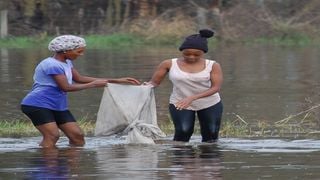
Residents of Barut in Nakuru on a fishing expedition in Lake Nakuru water that has spilled to their residential areas in this July 2020 photo.
| Francis Mureithi | Nation Media GroupNakuru
Premium
Lake Nakuru fish unfit for consumption: study
Lake Nakuru fish is not fit for human consumption, the Kenya Marine and Fisheries Research Institute (KMFRI) has warned.
A research conducted by KMFRI following complaints of faster-than-usual rotting of the fish, even when put under refrigeration, has concluded that untreated industrial effluent flowing into the water body poses potential danger to human health.
“We have industrial waste flowing into the lake, I will be cautious to consume fish from Lake Nakuru,” said researcher George Morara in the KMFRI report, noting that the lake is unregulated and its fish has never been declared fit for human consumption.
The KMFRI study has also found that Lake Nakuru fish has a higher concentration of nitrates than the level suitable for their growth and reproduction, again attributing this to the heavy contamination by industrial chemicals.
Turned black
Fishermen operating in Lake Nakuru started complaining mid last year that the fish they were catching had turned black and was decaying fast despite refrigeration.
They presented the complaint to the Nakuru County Government after nicknaming the caught fish "Blackie".
The fishmongers said that unlike the catch from Lake Naivasha, the Lake Nakuru fish was rotting fast, and that it had a strangely unpleasant smell.
A seasoned lake operator, Daniel Onyango, described the fish as foul-tasting compared to that caught in lakes Naivasha and Victoria.
“I have never consumed the fish because of fear but those who have tasted it say it is not palatable,” he said.
Mr Onyango said fish from the lake was normally sold in Nairobi and in some other parts of the country, but he noted that his suspicion made him stop selling it.
His colleagues, however, still sell it.
Constant complaints
KMFRI researchers began their investigations after the constant complaints by the fishmongers, especially after some fish was found dead in the lake in January last year.
The research found that there is a high level of nitrate in Lake Nakuru, with raising concerns that the fish is not safe for human consumption.
The Agriculture Chief Administrative Secretary (CAS), Linah Jebii Kilimo, said the quality of the fish is questionable.
“I understand the fish rots within three hours after being taken to the market,” said CAS Kilimo.
The report states that the mysterious January 2020 deaths were caused by toxicity, which happened at a time when most fishermen from Naivasha had relocated to Lake Nakuru as unlicensed operators took advantage of the fact that it is an unregulated lake.
Of the four fish species found in Lake Nakuru, Nile tilapia was the most affected by the deaths. Most of the dead fish were larger in size that the average catch found in the lake.
“The mortality continued until all fish were dead or until the substance had been degraded, neutralised or diluted,” notes the report.
Toxic nitrates
Besides Nitrate, the concentration of chlorophyll-a in the fish was found to be 84.49 milligrammes/litre (mgl-1) while others had a concentration of 77.35 mgl-1.
“Some of the points within Lake Nakuru were found to have the nitrates at a concentration of 67 milligrammes per litre indicative of organic and inorganic discharge into the lake, possibly originating from industrial or municipal waste. The concentrations of chlorophyll-a, the report notes, is indicative of the excessive nutrient loads in the water and led to an increase in algae biomass.
The scientists note that nitrates are toxic in amounts greater than 45 milligrammes/litre, and that the environmental conditions in Lake Nakuru are not optimum for the growth and reproduction of the fish.
According to the World Health Organization, the recommended level of nitrate is less than 45 milligrammes/litre. Anything above the recommended levels is considered not fit for aquatic life.
When she led a restocking in Lake Naivasha on Monday, Ms Kilimo said the researchers should make public their findings about the quality of fish in Lake Nakuru.





